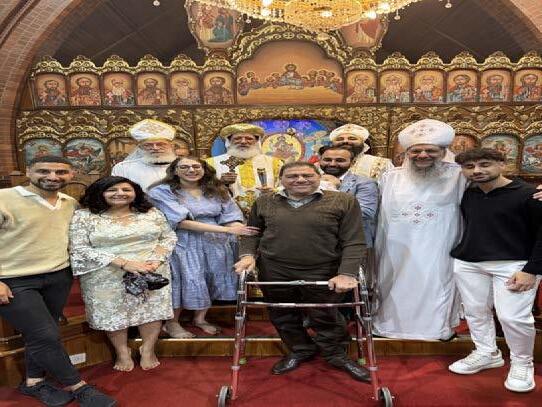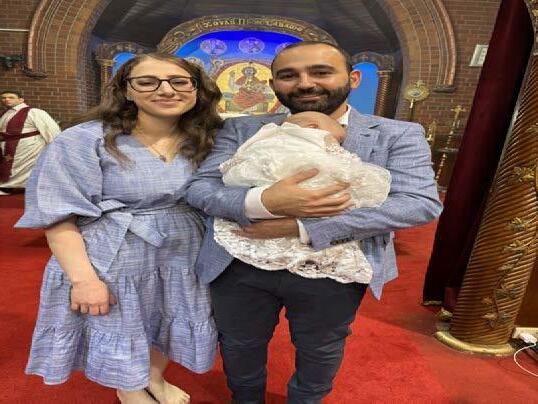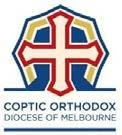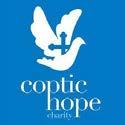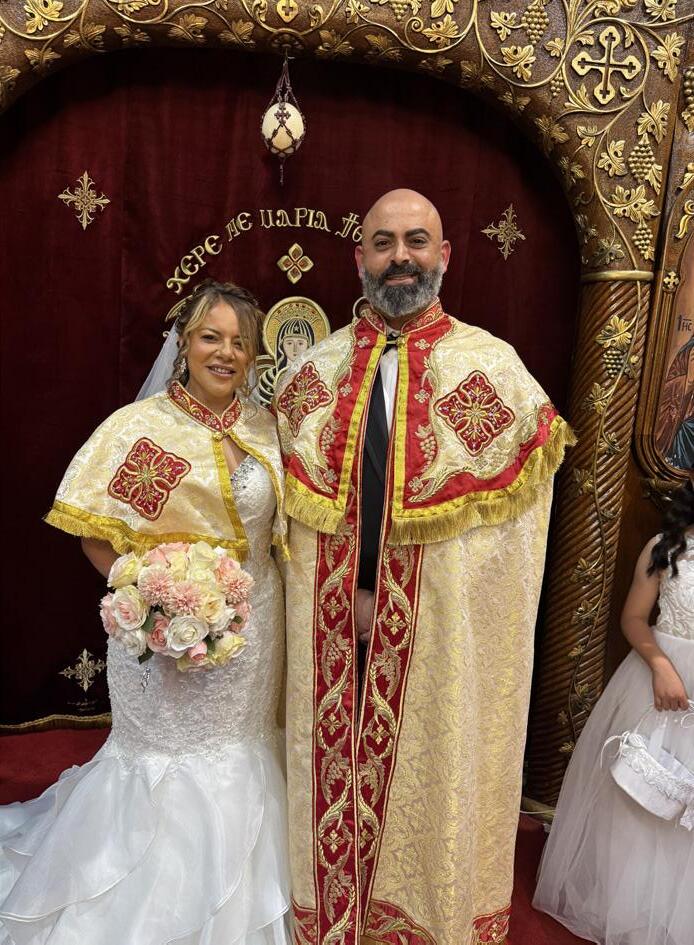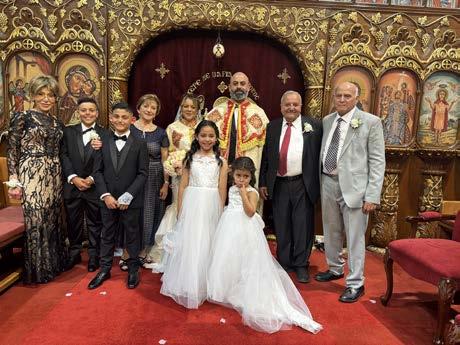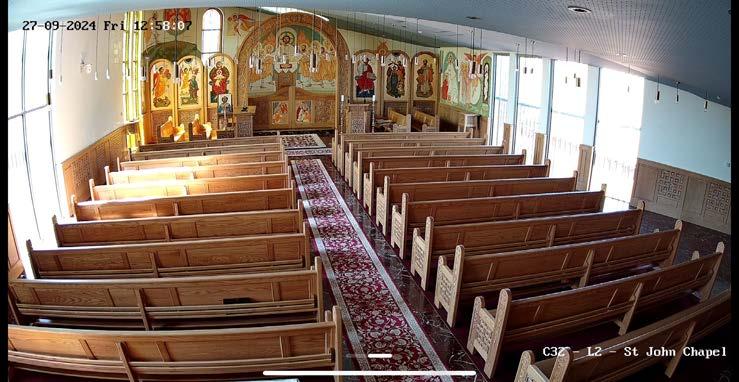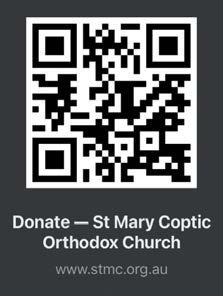
Services at St Mary’s Church
Monday:
Mass 9 - 11 am
Tuesday
Liturgy 5:30 - 7am
7:30pm The Way Orthodox Fellowship in Englisg for adults - All ages
Wednesday: Mass 9 – 11 am
6:30-8pm School of Deacons Adults
Thursday
Mass 9 - 11 am - English
English Midnight Praises 7:30pm
English Bible Study 7:30pm
Friday: Mass Mass 9 – 11 am
Youth 25 and above 7-9pm
Discipleship Clas Class 7-8:30pm
Saturday: Mass: 8:30 – 11am
Sunday School 4 – 5.30pm
Vespers & youth meeting 7-8:30pm English
Vespers &Bible Study Arabic 5:30-7pm
Scouts 1:30 - 3pm
School of Deaconsgip 3 - 4pm
Sunday:
1st Mass 6:30 - 8:30 Arabic & English
2nd Mass.8:30 - 10:30 English - St Mary’s
Church
3rd Mass 8:30 - 10:30 Arabic - St John’s
Chrysostom Church
Family Meeting fortnightly 11:30am
Hymns Class - English 11:45 - 12:30pm
Church Priests:
Fr Tadros Sharobeam 0414251251
Email: frtadros@me.com
Fr Habib Girgis Younan: 0401238177 – 94498871
Email: habibgirgisyounan@hotmail.com
Fr Michael Salib: 0422431821
Email: frmichael@sac.edu.au
Church Address: 5 Epsom Rd., Kensington Vic 3031 Tel: 93766651
Fr Kerillos Tawadros 0411 518 399
Fr John Makary 0433 445 636
The Departure of St. Cyriacus.
member of Constantinople Council
13th November - 4th Hator
On this day, the holy father, St. Cyriacus, departed. This striver was brought up in the city of Corinth in Greece. He was the son of Orthodox Christian parents, who taught him the church subjects. They brought him to Abba Peter, Bishop of Corinth, who was his cousin, and he ordained him a reader. Cyriacus read continually and searched in the interpretations of the Holy Scriptures until he surpassed many in it. Abba Peter appointed him to read to the people in the church and to him in his cell, and he was pleased with him.
When he was 18 years old, his parents asked him if he wished to marry, but he refused. He asked them for permission to visit one of the monasteries in order to be blessed by the saints therein. He continued to visit the monastery from time to time and he longed for the monastic garb. He went to the Holy city, Jerusalem, and met its bishop, Abba Cyril. He presented to him his wish to become a monk. Abba Cyril approved his wish and prophesied of him saying that he would become a great father, would have many accomplishments, and many souls would be enlightened by his teachings. He blessed him and sent him to the great father Euthymius (Otimus(, the father of the monks of Palestine. Father Euthymius accepted him with joy and put the garb of the monk on him. He handed him to one of the elders of the monastery who taught him the ways of worship and revealed to him the artifices of Satan. Abba Cyriacus lived a virtuous life with much asceticism besides humility, godliness and devoutness. God bestowed upon him the gift of healing. He healed all those who came to the monastery with all kinds of sicknesses or infirmities. His virtues and his holiness spread everywhere. This holy man accompanied Abba Cyril, Bishop of Jerusalem, to the Ecumenical council of the hundred and fifty that gathered at Constantinople because of Macedonius, the enemy of the Holy Spirit. Abba Cyriacus opposed his arguments and vanquished him by evidences and proofs. He departed at a good old age. The Lord made manifest from his body after his departure, many signs and miracles. His body still rests in one of the monasteries of the city of Jerusalem, without any change or corruption, to the extent that anyone who sees him today would think that he just died only a short time ago. More than 700 years have passed from the time of his departure till the writing of his biography. He lived at the time of Theodosius the Great in the later part of the fourth Christian century. His intercession be for us. Amen.
The Appearance of the Head of St. Longinus, the Soldier. 14th November - 5th Hator
On this day was the appearance of the head of St.
Longinus the Soldier who pierced the side of our Savior, when He was on the Cross. Emperor Tiberius Caesar sent a soldier to Cappadocia to cut off the head of this saint, as it is written in the 23rd day of the month of Abib. The soldier fulfilled the order and brought the head to Jerusalem, and handed it to Pontius Pilate. Pilate showed the head to the Jews, who rejoiced at his deed. Pilate commanded that the head be buried in some of the piles of dirt outside Jerusalem.
There was a woman who had believed at the hands of St. Longinus when he preached in Cappadocia. During his execution, she stood, weeping, and witnessed his martyrdom. Later on she became blind. So, she took her son and departed to Jerusalem to be blessed by the holy places, and the holy sepulchre, hoping that she might regain her sight. When she arrived in Jerusalem, her son died. She became very sad and grieved because of her condition and there was no one to take her back to her own country.
During her sleep she saw St. Longinus, and with him, was her son who had died. He directed her to whereabout his head was buried and ordered her to remove it. When she woke up, she looked for the place until she found it. She dug in the ground and a sweet aroma of incense came out. When she reached the head of the saint, a great light shone from it and straightaway her eyes were opened and she was able to see.
She glorified the Lord Christ, kissed the head, perfumed it, and placed it with the body of her son. Then she returned to her own country glorifying the Lord Christ Who performed wonders through His saints. The prayers of this saint be with us. Amen.
The Departure of St. Felix, Pope of Rome. 15th November - 6th Hator
On this day, the holy father St. Felix, Pope of Rome, departed. He was born of Christian parents in Rome in the year 210 A.D. They raised him with high principles and he gradually advanced in the clerical ranks. Astasius, Pope of Rome, ordained him a deacon. Pope Justus, seeing his righteousness and virtues, ordained him a priest. When Abba Dionysius, Pope of Rome, (who was contemporary of St. Thaouna, Pope of Alexandria( departed, this father was chosen for the Roman See. He shepherded the flock of Christ with the best of care. When Aurelianus Caesar reigned, he incited persecution against the believers of the Lord Christ. He tortured them using very painful methods, and many of them were martyred by his hands. Since great tribulation befell St. Felix from the Emperor, he entreated God to take these tribulations away from His people. Because of his prayers, the Emperor died in the second year of his reign. When Diocletian reigned, he also persecuted the Christians and started torturing them. Pope Felix prayed to the Lord to spare him from witnessing the torture of the Christians.
So, he departed in the first year of the reign of Diocletian, after he had sat upon the Apostolic throne for five years. He left many sayings and discourses, some of which were useful teachings and others were about the doctrines. His prayers be with us. Amen.
The Martyrdom of St. George of Alexandria.
On this day, St. George (Gawargios( of Alexandria, was martyred. His father was a merchant in the city of Alexandria and had no son. It happened that he travelled to the city of Lydd and attended the feast of the consecration of the Church of St. George the martyr. He prayed to God, interceding with His great saint that he might have a son. God answered his prayers, and gave him a son, and he named him George. His mother was the sister of Armenius, the Governor of Alexandria. His parents died when he was 25 years old. George was merciful, loving and kind to the poor and loved the church. He stayed with his uncle who had only one daughter. One day she went with some of her friends for an outing. While they were walking nearby a monastery outside the city, she heard its monks singing sweet hymns. She was touched by what she had heard and asked her cousin George about it. He replied that those monks had forsaken the world to worship and he guided her to believe in the Lord Christ. He told her about the share of the sinners of the final punishment and the share of the righteous of felicity.
When she returned to her father, she told him that she was a believer of Christ. He tried to reason with her, to dissuade her, and to lure her with great promises. Then he threatened her. When she did not hearken to his words, he ordered that her head be cut off, thus she received the crown of martyrdom. Later on, the Governor knew that George was responsible for her conversion. He seized him and tortured him severely. Then he sent him to Ansena where they also tortured him and finally they cut off his holy head, thus he received the crown of martyrdom. A deacon whose name was Samuel, took his holy body and carried it to the city of Manf, El-Giza province. When the wife of his uncle Armenius knew about it, she sent for the body and placed it with the body of her martyred daughter in Alexandria. Their intercession be for us. Amen.
The Consecration of the Church of St. George of Cappadocia.
16th November - 7th Hator
Also on this day, is the commemoration of the consecration of the Church of the honorable saint and great martyr St. George in the city of Lydd. We also commemorate the great wonders and signs, the Lord has done therein which became known throughout the land and sea. When Emperor Diocletian heard the reports of this church, he sent Eukheius, the head of his army, with soldiers to destroy it. Eukheius came with arrogance to where the icon of St. George was and he began to scoff at the Christians and at the Saint. He had a staff in his hand with which he struck the lamp, which was burning before the icon of St. George
and he broke it. A fragment of the lamp fell on his head. Fear and great trembling came upon him and he fell prostrate on the ground. The soldiers carried him, to take him back to his country, for they knew that this had happened to him because of his mockery towards this great martyr. Eukheius died on the way back with disgrace, and they cast him into the sea. When Diocletian heard this, he became angry and decided to go himself to this church and destroy it. The Lord bore no longer with him to do what he had determined to do and He smote him with blindness and the men of his kingdom rose up against him. The Lord took the kingdom away from him and placed Constantine, a righteous Emperor, in his place. Emperor Constantine closed pagan temples and opened the churches. The churches and the universe rejoiced, especially the church of the great martyr, the star of the morning, St. George. His intercession be with us and Glory be to our God, forever. Amen.
The Martyrdom of St. Nehroua. 16th November - 7th Hator
On this day also, St. Nehroua, was martyred. He was from the district of Fayyum and he feared God. When he heard the accounts of the martyrs, he went to Alexandria to die for the Name of the Lord Christ. He was told in a vision that he must go to Antioch. While he was thinking of how to go there and looking for a ship to embark on, God sent to him His angel Michael, who carried him on his wings from Alexandria to Antioch and set him down before Diocletian. There he confessed the Lord Christ. Diocletian asked him about his name and his country, and when he knew Nehroua›s story, he marvelled at the manner in which he had come. Diocletian offered him much money and many prizes to turn him away from his faith, but Nehroua refused. Then Diocletian threatened him, but could not frighten him. Therefore the Emperor ordered that he be tortured in many different ways. One time they tortured him by releasing lions to attack him, once by burning him in a fire, another by squeezing him in the wheel, and still another time by casting him in a cauldron with fire under it. Finally, they cut off his holy head with a sword and he received the crown of martyrdom. St. Nehroua became a counterpart for those from Antioch who were martyred in the land of Egypt. It happened that St. Julius El-Akfahsee was present at the time of his martyrdom, so he took his body and sent it with two of his men to St. Nehroua›s country with great honor. Their intercession be for us. Amen.
First
Sunday of Hator
Luke 8: 4-15 Mark: 4: 1-20 Mathew 13: 1 - 23
“The seed is the word of God” Luke 8: 11
Ref: Gospel of St Mark - Fr Tadros Malaty
The Lord Christ told the multitude the parable of the sower who went out to sow. Some of the seeds fell by the wayside, some fell on stony ground, some fell among thorns, and some fell on good ground, where they increased and produced, some thirty fold, some sixty, and some a hundred. St. Matthew the evangelist, mentioned that same parable (13:1- 23( and it was also mentioned by the evangelist St. Luke (8: 5 - 15(. The following points are to be noticed:
a- The evangelist St. Mark presented the continuous labor of the Lord Christ, as a Minister to humanity, that was faced by persistent opposition, yet, along with that opposition, there had been growing fruit. Indeed, there are souls that are similar to the wayside fallen seeds, where the birds of the air came and devoured the seeds. There are souls that are more like seeds that fell on the stony ground, where, though the seeds grew up fast, yet were scorched by the heat of the sun. There are souls that are choked by the thorns of the world. Yet, there are also souls that are like good ground, receiving the seeds to produce a crop that is pleasing to the heart of God.
b- St. John Chrysostom explains that, when the Lord Christ says, “A sower went out to sow”, he means by saying “went out”, the Divine incarnation. As the Word of God, the true Sower, is omnipresent, He does not go out to a certain place. Through Divine ordinance, He adopted a body, as though to come out to us, we who were rejected, to reconcile us with His Father, and to let us enter anew into the Divine presence. We exited from paradise, as He who inseparable form the father, “went out” to us, the sinners, to bring us back to the bosom of the Father and bring us to union with Him through remission of our sins. The expression “went out” probably means God’s initiation of love. He is always coming out to man with love, while man, in his weakness, is unable to encounter his God or to enter into His Divine presence. The Lord Christ is addressing the Jews, His own people, whom He came to. By saying “Went out”, He probably means proclaim his imminent going out to the Gentiles, having been rejected by His own.
c- The Lord Christ, Himself, presented an interpretation of that parable to His disciple; and we have already paraded some of the sayings of the fathers concerning that Divine interpretation. Here, I shall have to limit myself to certain quotations from sayings by St. Cyril, the Great: [The Savior says that the sower went out to sow; Who is that sower? He is without doubt the Lord Christ, as He is the One who sows the good things. By Him and for Him, spiritual fruits are harvested, according to His saying: “I
am the vine, you are the branches; He who abides in Me, and I in him, bears much fruit” (Jn.15:5(. You have to notice, how the sower goes around, sowing seeds all around, some falling by the wayside, some on the stony rocks, some among the thorns, and some on good soil. Those that fell by the wayside, were trampled on; what fell on the rocks, immediately sprang up, then withered away; what fell among the thorns grew up, and were choked; while those that fell on the good soil, increased and produced a rich crop, estimated to be hundredfold... Why were the seeds on the wayside wasted? Because of the hardness of earth, being solid earth was unsuitable for agriculture. These were trampled on by those coming and going, which caused the scattered seeds to be devoured by the bird of the air. Such is the case with “hard headed” people, characterized by arrogance and stubbornness. When the Divine words of God fall on them, they will go nowhere, and will not give fruits of God’s fear, or of heavenly virtues. Such people make themselves like the wayside seeds, to be trampled on by the unclean spirits, and even by Satan himself, leaving no place in them to proclaim the holy fruits. I wish the people, whose hearts are barren, would wake up, and open their minds to the holy seed of truth, to produce in them the fruits of pure life ! Be sure to watch over your thoughts, and to close your doors firmly, to keep out thieves and robbers. Chase away flocks of birds of the air, to protect the seeds and to produce a rich and plentiful crop.
Let us now contemplate on the seeds that fell on the stony ground, or rather the people who, when they hear the word, immediately accept it with gladness, but stumble when tribulation or persecution arise. Such people do not enter into the crucible of temptations, interested only in empty words, but are distance themselves from meditating upon secrets of heaven. Their piety is therefore, mere nonsense, as they lack any deep roots in a fertile soil. They cheat the Church, by showing gladness in what they hear from the preacher, pouring on him a flood of compliment, without any comprehension or discernment, but out of impure will and unsound heart. Once they leave the threshold of the Church, they forget altogether what they heard, and resume their twisted ways; they do not keep anything that may grow or give fruit. If the Church is safe, in peace, and not passing through any temptation or persecution, they show off their faith to a certain extent, yet, if there is any change of circumstances to the worse, bitter prosecution starts by the fierce enemies of faith, these people refrain from taking part in the strife, as they are devoid of spiritual zeal and Divine love. Rather, they are more inclined to cowardice.
Why do you run away, O feeble ones and cowards, from a fight you are prepared for, and where would your pride and glory be? Stand fast, and lay bare your spiritual swords, as beyond your steadfastness, there would be
glory and honor... If we suffer in defending our faith in Christ, we will get honored with the crowns of victory and glory. Let us know, that, to die with honor, would be far better than a life of shame, as expressed by the Savior to His holy disciples: “Do not be afraid of those who kill the body, and after that have no more that they can do. But I will show you whom you should fear; Fear Him who, after He has killed, has power to cast into hell” (Lk.12:4(. Did the Master demand from us to suffer, while He was not willing to do the same Himself? No! He gave Himself up for us , and purchased the whole world with His blood; We do not own our souls; we belong to the redeemer who saved us, as expressed by the apostle Paul: “For to this end Christ died and rose and died again, that he might be Lord of both the dead and the living” (Rom.14:9(. Let us be steadfast and daring, so that, if the storms of temptation blow against us, we will be able to overcome difficulties by graceful patience and perseverance. Let us rejoice in confronting afflictions and tribulations, for in them there is the chance of revealing goodness by our Lord Jesus Christ.
Now, let us contemplate on the truth of that parable, as far as the thorns that choke the Divine seeds; The Savior says: “Now these are the ones sown among thorns; they are the ones who hear the word, and the cares of this world, the deceitfulness of riches, and the desires for other things entering in, choke the word, and it becomes unfruitful” (verse 18,19(. The redeemer sows the seeds, and they fall on hearts that seem to be strong and fruitful; Yet, after a while, they get choked by the cares and deceitfulness of life, which dry up and wither the seeds; or as said by the prophet Hosea: “They sow the wind, and reap the whirlwind. The stalk has no bud; it shall never produce meal. If it should produce, aliens would swallow it up” (Hos. 8:7(. We should know, that the Divine seeds will not blossom, unless we drive away, from our minds all worldly cares, and all pride in vain riches; “For we brought nothing into this world, and it is certain we can carry nothing out” (1 Tim.6:7( What would be the benefit for us to possess corruptible things; when, “The Lord will not allow the righteous soul to famish, but He casts away the desire of the wicked” (Prov. 10:3(. Didn’t you notice that, in circumstances of evil, we get choked by greed, drunkenness, foul play, pride, as expressed by the apostle John, the beloved: “For all that is in the world -- the lust of the flesh, the lust of the eyes, and the pride of life -- is not of the Father but is of the world. And the world is passing away, and the lust of it; but he who does the will of God abides forever” (1 Jn.2:16(.
The good ground is that one that produce a hundredfold; People usually compliment their ground when it gives them a rich crop. A saintly prophet described such fertile soil, saying, “And all the nations will call you blessed, for you will be a delightful land; says the Lord of hosts” (Mal. 3:12(. The word of God, if hearkened by a mind,
pure from thorns, will grow and produce a rich crop of fruits. St. Matthew says, concerning this chapter, that the good ground was of three grades: “Some (producing( a hundredfold, some sixty, some thirty” (Mt. 13: 23(. Take notice, that as the Lord Christ showed three grades of loss, He showed also three grades of wins and benefits. The seeds that fell on the wayside were devoured; those that fell on the stony ground dried up: those that fell among the thorns were choked; while those that fell on good ground, produced rich crops of hundred-, sixty-, and thirtyfold. Or, as said by the wise apostle Paul: “Each one has his own gift from God, one in this manner and another in that” (1 Cor.7:7(. Not all the saints have the same success; We are instructed to seek the good work, to choose the best that pleases the Lord Christ, to whom, and to God the Father, the Holy Spirit, be praise and authority, now and forever, Amen.
If it is the same sower, and the same seeds on all grounds, let us not fall by the wayside, open to evil spirits, so that the seeds may not be devoured by the birds of the air, for we would be robbed of the Divine fruit. And let us not be with a stony heart, devoid of love for God, and fellow men, so as to give the seeds the chance to have deep roots in us. Let us not allow the thorns, the cares of this world and the deceit of riches, choke the word, but let us surrender our lives into His hands, to make of them a good soil that receives His word, producing good crop.
d- Someone may ask, why did the Lord sow the seeds on the wayside, on the stony ground and on the thorny places, and did not sow them all on the good ground?
1- A scholar believes that we cannot understand that parable, unless we know two things: First, in the land of Palestine, they used to begin by sowing the seeds, then plow the ground with a wooden plow. Thus, any ground that receives the seeds would produce fruits, if it got plowed after that, to turn it into good agricultural land. We can also add, that the seeds are given to all, as the word of God is offered free to all, but he who accepts in his life, the wooden plow, that is the cross, will enjoy the fruit of the word in him. But he, who persists on leading his spoiled life, will have the birds of the air devour the seeds. They are called the birds of the air, because the evil spirits were originally spiritual and heavenly, before getting corrupted through falling into the sin of pride. The “Stony ground” represents the limestone that is covered by a thin layer of soil, which is common in the region of Galilee. So the sower sows the seeds on an apparently good soil, not knowing that it hides a core of stone.
2 - Acknowledging human freedom, God offers His word to all ... Thus, although there are three kinds of ground, that do not produce fruit, though there is a fourth one that produces an amazingly rich crop: a hundredfold, a sixty-, and a thirtyfold. This refers to the exalted glory to be enjoyed by the believers in inheritance.


